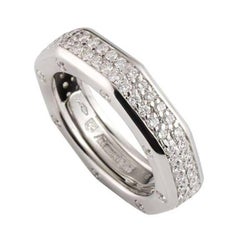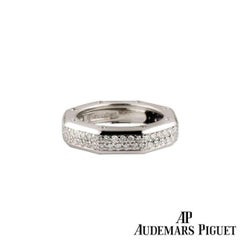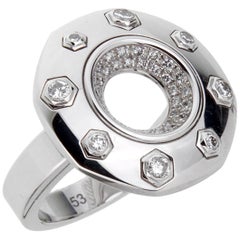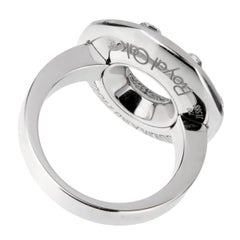Royal Oak Ring For Sale on 1stDibs
Find the exact royal oak ring you’re shopping for in the variety available on 1stDibs. Each design created in this style — which was crafted with great care and often made from
Gold,
18k Gold and
White Gold — can elevate any look. You can easily find a 2 antique edition and 9 modern creations to choose from as well. You’re likely to find the perfect royal oak ring among the distinctive items we have available, which includes versions made as long ago as the 20th Century as well as those produced as recently as the 21st Century. Today, if you’re looking for a
round cut version of this piece and are unable to find the perfect match, our selection also includes alternatives. There aren’t many items for
men if you’re seeking a royal oak ring, as most of the options available are for
women and unisex.
How Much is a Royal Oak Ring?
The price for a royal oak ring starts at $2,300 and tops out at $6,000 with these rings, on average, selling for $4,450.
Audemars Piguet for sale on 1stDibs
The story of celebrated family-owned manufacturer Audemars Piguet and its universally acclaimed, widely coveted luxury watches begins deep in the Jura Mountains in western Switzerland.
The Vallée de Joux has been a haven of watchmaking since the late 18th century, when the residents of farming communities began creating timepieces during the winter months.
Jules Louis Audemars (1851–1918) and Edward Auguste Piguet (1853–1919), both natives of the region, were already deeply entrenched in the world of watchmaking when they joined forces to form a new house of horology near the end of the 19th century, an alliance that would be the start of a multigenerational family company. With complementary specialties within the field, Audemars and Piguet made the perfect pair in 1875: Audemars, the more technically minded of the two, oversaw production, while Piguet specialized in quality control and led the business and marketing parts of the outfit.
Audemars Piguet’s first major milestone came in 1892, when it created the world’s first minute-repeating movement for a wristwatch. (It was sold to Omega, whose origins date to 1848.) That was soon followed in 1899 with the Universelle pocket watch, a masterpiece of horology that boasted a perpetual calendar, minute repeater, alarm and chronograph with jumping seconds. It is still said to be the most complicated timepiece that Audemars Piguet has ever designed.
Between 1918 and 1919, both founders of Audemars Piguet had died and were replaced by their respective sons, incidentally both named Paul. Under the leadership of Paul Louis Audemars and Paul Edward Piguet, the watchmaker continued to innovate. It retained an ever-evolving technical focus and found new praise for its efforts, producing the world’s thinnest pocket-watch caliber in 1925, the first skeletonized pocket watch in 1934 and the world’s thinnest wristwatch in 1946.
When the quartz crisis of the 1970s left many watchmakers in the lurch, Audemars and Piguet found a creative solution, tapping the Geneva-born Gérald Genta to conceive the first-ever luxury watch in stainless steel. Launched at what would become the Baselworld watch and jewelry fair in 1972, the Royal Oak, with its octagonal face and integrated bracelet, would come to define the look of Audemars Piguet and revolutionize the luxury wristwatch industry, setting a standard that continues to this day.
Find a collection of vintage Audemars Piguet wristwatches and pocket watches on 1stDibs.
The Legacy of Diamond in Jewelry Design
Antique diamond rings, diamond tiaras and dazzling vintage diamond earrings are on the wish lists of every lover of fine jewelry. And diamonds and diamond jewelry are primarily associated with storybook engagements and red-carpet grand entrances — indeed, this ultra-cherished gemstone has a dramatic history on its hands.
From “A Diamond Is Forever” to “Diamonds Are a Girl’s Best Friend,” pop culture has ingrained in our minds that diamonds are the most desired, the most lasting and the most valuable gemstone. But what makes the diamond so special? Each stone — whether it’s rubies, sapphires or another stone — is unique and important in its own right. April babies might claim diamonds for themselves, but just about everyone wants this kind of sparkle in their lives!
There are several factors that set diamonds apart from other stones, and these points are important to our gem education.
Diamonds are minerals. They are made up of almost entirely of carbon (carbon comprises 99.95 percent; the remainder consists of various trace elements). Diamonds are the hardest gemstones, ranking number 10 on the Mohs Hardness Scale. Even its name, diamond, is rooted in the Greek adamas, or unconquerable. The only object that can scratch a diamond is another diamond. Diamonds are formed deep within the earth at very high temperatures (1,652–2,372 degrees Fahrenheit at depths between 90 and 120 miles beneath the earth’s surface) and are carried up by volcanic activity. Diamonds are quite rare, according to the Gemological Institute of America, and only 30 percent of all the diamonds mined in the world are gem quality.
In the 1950s, the Gemological Institute of America developed the 4Cs grading system to classify diamonds: clarity, color, cut and carat weight. Not all diamonds are created equal (there are diamonds, and then there are diamonds). The value of the diamond depends on the clarity (flawless diamonds are very rare but a diamond's value decreases if there are many blemishes or inclusions), color (the less color the higher the grade), cut (how the diamond’s facets catch the light, certain cuts of diamonds show off the stone better than others) and carat weight (the bigger, the better).
When you start shopping for a diamond engagement ring, always prioritize the cut, which plays the largest role in the diamond's beauty (taking the time to clean your diamond ring at least every six months or so plays a role in maintaining said beauty). And on 1stDibs, a range of buying guides can be found for those in the market for antique engagement rings, vintage engagement rings or Art Deco engagement rings.
Shop antique and vintage diamond rings, diamond necklaces and other extraordinary diamond jewelry on 1stDibs.
Finding the Right Rings for You
Antique and vintage rings have long held a special place in the hearts of fine jewelry lovers all over the world.
No matter their origin or specific characteristics, rings are timeless, versatile accessories. They’ve carried deep meaning since at least the Middle Ages, when diamond rings symbolized strength and other kinds of rings were worn to signify romantic feelings or to denote an affiliation with a religious order. Rings have also forever been emblematic of eternity.
Over time, rings have frequently taken the form of serpents, which have long been associated with eternal life, health and renewal. Italian luxury jewelry house Bulgari has become famous for its widely loved Serpenti motif, for example, and its Serpenti ring, like the other accessories in the collection, began as an homage to jewelry of the Roman and Hellenistic eras. The serpent is now a popular motif in fine jewelry. Jewelry devotees have long pined for rings adorned with reptiles, thanks to antique Victorian rings — well, specifically, Queen Victoria’s illustrious engagement ring, which took the form of a gold snake set with rubies, diamonds and an emerald (her birthstone). Designs for Victorian-era engagement rings often featured repoussé work and chasing, in which patterns are hammered into the metal.
Engagement rings, which are reliably intimidating to shop for, are still widely recognized as symbols of love and commitment. On 1stDibs, a range of buying guides can be found for those in the market for antique engagement rings, vintage engagement rings or Art Deco engagement rings.
The most collectible antique engagement rings and vintage engagement rings are those from the Victorian, Edwardian and Art Deco eras. Named for the monarchies of the four King Georges, who in succession ruled England starting in 1714 (plus King William’s reign), antique Georgian rings, be they engagement rings or otherwise, are also coveted by collectors. Pearls, along with colored gemstones like garnets, rubies and sapphires, were widely used in Georgian jewelry. The late-1700s paste jewelry was a predecessor to what we now call fashion or costume jewelry.
The Art Nouveau movement (1880–1910) brought with it rings inspired by the natural world. Antique Art Nouveau rings might feature depictions of winged insects and fauna as well as women, who were simultaneously eroticized and romanticized, frequently with long flowing hair. Art Deco jewelry, on the other hand, which originated during the 1920s and ’30s, is by and large “white jewelry.” White metals, primarily platinum, were favored over yellow gold in the design of antique Art Deco rings and other accessories as well as geometric motifs, with women drawn to the era’s dazzling cocktail rings in particular.
Whether you’re hunting down a chunky classic for a Prohibition-themed cocktail party or seeking a clean contemporary design to complement your casual ensemble, find an exquisite collection of antique, new and vintage rings on 1stDibs.



